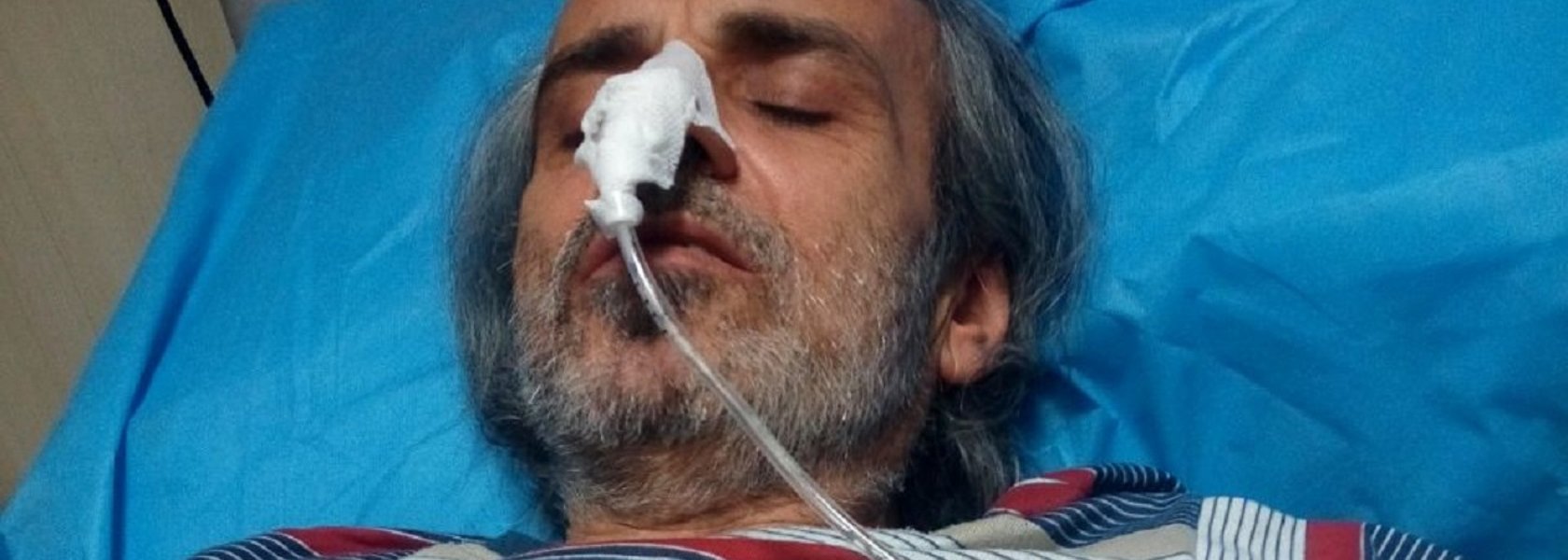According to the information received, on May 29, 2016, Mr. Mohammad-Seddiq Kaboudvand, the imprisoned President of Human Rights Organisation of Kurdistan, lost consciousness as a result of a drastic fall in his blood pressure following three weeks of hunger strike. His family members reported that his health conditions were grave and expressed great concern about his extreme loss of weight and his deteriorating heart and prostate conditions. Mr. Kaboudvand was transferred to the hospital on May 22, but demanded to be returned to prison after doctors tried to force-feed him. On May 25, after his health conditions deteriorated, he was hospitalised again. Doctors at the hospital said he might suffer a heart attack if he continued his hunger strike.
Mr. Kaboudvand started his hunger strike on May 8, 2016 to protest against the “fabricated charges” that have recently been brought against him in a new case, and to demand the implementation of Article 134 of the 2013 Islamic Penal Code in his case, which would reduce his current prison sentence by six months. Although he has agreed to receive medical care, on June 2 he vowed to continue his hunger strike until his demands are met.
Mr. Kaboudvand has been serving a prison sentence totalling 10.5 years since July 1, 2007: 10 years for founding and administering the Human Rights Organisation of Kurdistan and six months for his work as a journalist and editor of the weekly Payam-e Mardom-e (Message of People of) Kurdistan.
Mr. Kaboudvand has faced frequent harassment during the past nine years in arbitrary detention. On April 17, 2014, he was severely beaten along with a large number of other prisoners of conscience, and suffered severe injuries including three broken ribs, two broken toes and kidney bleeding1. He has also suffered from various diseases and health problems while in prison, including a heart attack, dizziness and loss of consciousness, and prostate and kidney problems2 and has gone on hunger strike several times in protest against his treatment.
In addition, the authorities appear to be intent on preventing Mr. Kaboudvand’s release. On July 28, 2015, the Prosecutor of Tehran rejected outright the request of Evin prison’s governor who had recommended Mr. Kaboudvand’s “conditional release”. Moreover, he is facing new charges of “gathering and collusion to take action against national security” and “spreading propaganda against the State” that would prolong his imprisonment by up to six years. It has to be noted that Mr. Kaboudvand has been summoned to the Prosecutor’s Office three times since early March 2016 and the interrogators threatened him with five more years in prison.
The reasons cited for the new charges included: issuing a message of congratulations for the liberation of the Syrian town of Kobane from the control of ISIS forces, writing a letter to the leader of the pro-Kurdish People’s Democratic party (HDP) in Turkey on peace with the Turkish government, and his ongoing work on his academic dissertation about “the violation of rights of prisoners in Iran”. Mr. Kaboudvand rejected all the charges, pointing out that his dissertation is about “Turkey and minorities” and has nothing to do with Iran.
On May 24, Mr. Kaboudvand was taken to Branch 28 of the Islamic Revolution Court at a day’s notice and faced a brief trial without his lawyer for the charge of “spreading propaganda against the State”. The court has not issued its verdict yet. He told his family that he might face another trial, possibly for the charge of “gathering and collusion to take action against national security”.
The Observatory recalls that the authorities have already pursued a similar tactic of fabricating new charges against several prisoners of conscience, including human rights defenders, and condemned them to new prison sentences to prevent their release, including notably Messrs. Behnam Ebrahimzadeh, member of the Committee to Pursue the Establishment of Labour Unions (CPELU) and a child rights activist, Reza Shahabi-Zajaria, Treasurer of the Syndicate of Workers of United Bus Company of Tehran, and Mehdi Farahi-Shandiz, a member of the CPELU and of the Teachers Association of Iran (TAI).
The Observatory also recalls that the United Nations Working Group on Arbitrary Detention in an opinion adopted at its 65th session (November 14-23, 2012) found Mr. Kaboudvand’s detention to be arbitrary and called on the government of the Islamic Republic of Iran to “release him forthwith and accord him an enforceable right to compensation”.
The Observatory urges the Iranian authorities to guarantee the physical and psychological integrity of Mr. Kaboudvand, and to release him immediately and unconditionally since his detention is arbitrary as it only aims at sanctioning his legitimate human rights activities. The Observatory more generally urges the Iranian authorities to put an end to all harassment - including at the judicial level - against all human rights defenders in Iran.
The Observatory for the Protection of Human Rights Defenders (the Observatory) was created in 1997 by FIDH and the World Organisation Against Torture (OMCT). The objective of this programme is to intervene to prevent or remedy situations of repression against human rights defenders.

